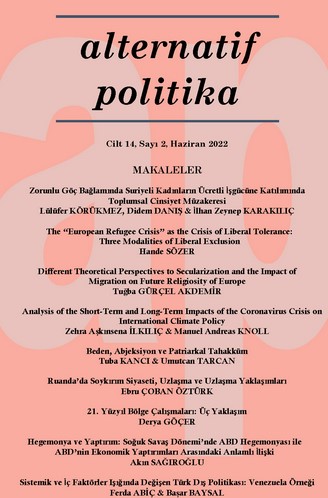SİSTEMİK VE İÇ FAKTÖRLER IŞIĞINDA DEĞİŞEN TÜRK DIŞ POLİTİKASI: VENEZUELA ÖRNEĞİ
CHANGING TURKISH FOREIGN POLICY IN THE LIGHT OF SYSTEMIC AND DOMESTIC FACTORS: THE CASE OF VENEZUELA
Author(s): Ferda ABİÇ, Başar BaysalSubject(s): Political history, Government/Political systems, International relations/trade, Political behavior
Published by: Rasim Özgür DÖNMEZ
Keywords: Turkey; Venezuela; Foreign Policy Analysis; Neoclassical Realism; Turkish Foreign Policy;
Summary/Abstract: This study aims to explain the development of Turkey’s relations with Venezuela in the context of the transformation of Turkish Foreign Policy through the lens of Neoclassical Realist theory. Turkey’s Venezuela policy differ from other foreign policy steps as it takes place at a time when the USA imposes sanctions on Venezuela. In this context, Turkey’s growing relative power and the permissive character of the strategic environment within the system since the end of the Cold War are considered as the main systemic factors that paved the way for Turkey to follow politics despite the USA. In the context of domestic factors, such as changes in Turkey’s domestic politics after 2002, the long-standing anti-US sentiment in Turkish society, the USA’s policies regarding July 15, 2016, coup attempt and conflicting policies of the USA and Turkey in the Syrian Crisis that affect society and leader perception were emphasized. Finally, in order to explain the recent development in the relations with Venezuela after 2016, the empathy brought by the coup/administrative change attempts in both countries and the rapprochement created by the democratic backsliding processes in both countries were emphasized.
Journal: Alternatif Politika
- Issue Year: 14/2022
- Issue No: 2
- Page Range: 422-452
- Page Count: 31
- Language: Turkish

